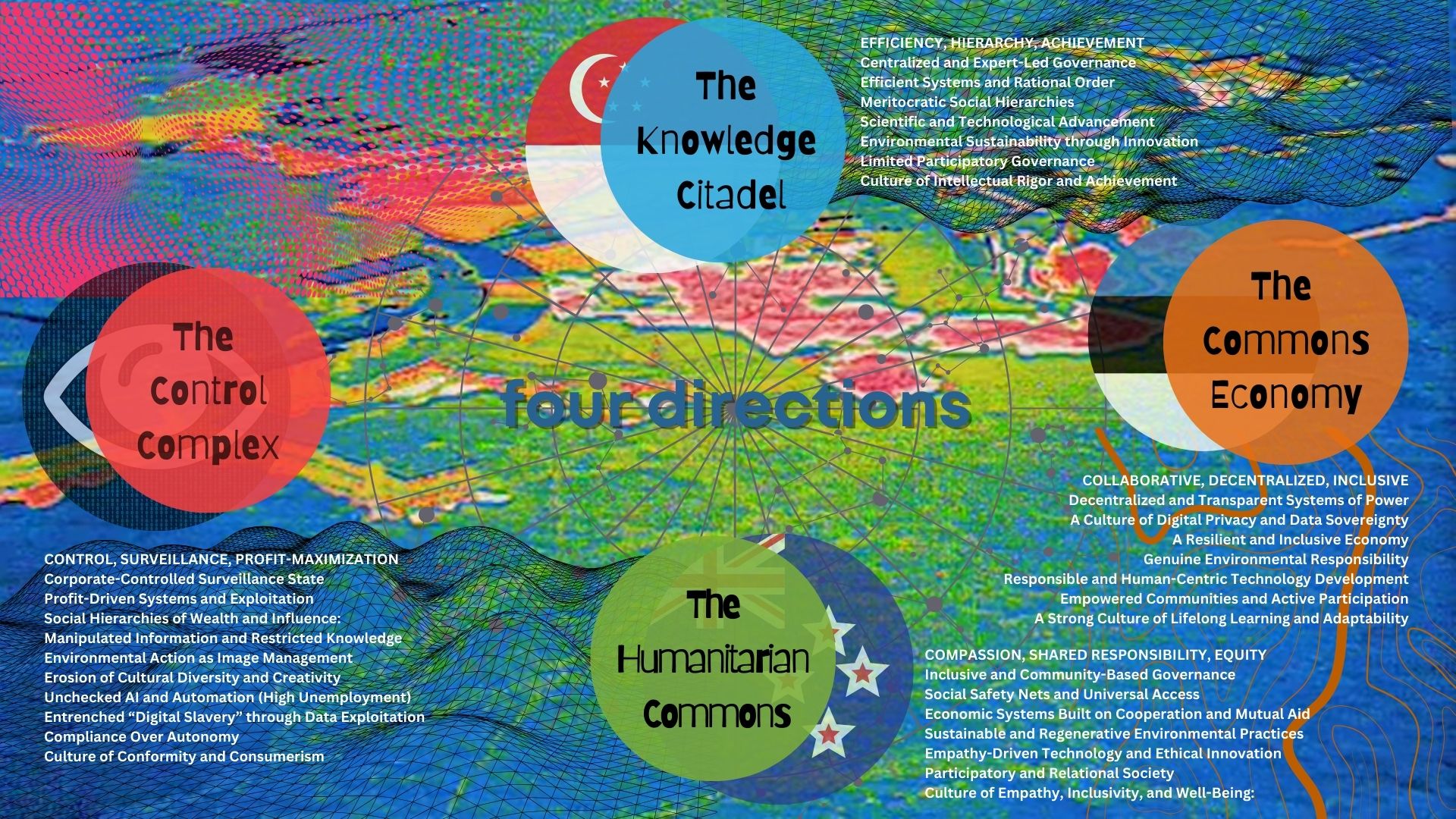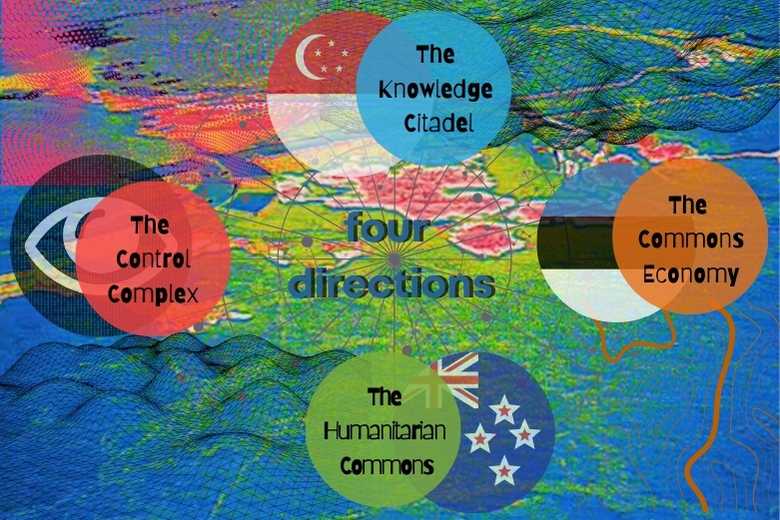As the world stands at a crossroads, with one path deepening divides through surveillance and control, and another fostering shared power and digital sovereignty, the choice between them becomes urgent. South Africa, with its rich history of resilience and community, may well be the proving ground for a more inclusive, Commons-driven future.
Dangerous Ideas as Signposts of Societal Evolution
By treating dangerous ideas not as threats but as opportunities for reflection and insight, we get a clearer view of the societal shifts that are both challenging and shaping the world’s future trajectory. As we delve more deeply into these ideas, a clearer picture emerges – not only of the structures and values that silence different thinking, but also of the pathways that can break-thru into new territory. Patterns of hierarchical, centralized control, superficial corporate social responsibility and encroachments on privacy underscore the need for alternatives that emphasize autonomy, genuine accountability and shared digital sovereignty.
In the Four Directions diagram below, The Control Complex coalesced as a future trajectory out of the patterns, paradoxes and trends of a collection of the dangerous ideas of our time. Considering alternative pathways, we fostered digital spaces where critical discourse, creative dissent and inclusive innovation thrive, paving the way for a future in which ideas are liberated and power is shared. The Commons Economy – although undoubtedly shaped by the existing Art Stoke Commons framework – was formed as an antidote to The Control Complex.
Then, imagining The Control Complex situated as a future trajectory in the West (setting sun) and The Commons Economy in the East (rising sun), the North and South trajectories in the form of The Knowledge Citadel and The Humanitarian Commons were envisioned.
The Four Directions – Possible Future Trajectories

The Control Complex
The Control Complex is a future where surveillance, data exploitation and economic monopolies dictate nearly every aspect of life. In this model, a powerful elite capitalizes on surveillance and manipulation, using technology to reinforce social hierarchies and restrict autonomy. Privacy is sacrificed for profit and creativity and dissent are stifled in favour of compliance.
As discussed above, the Control Complex framework was excavated through a process of analysing the patterns and paradoxes inherent in the dangerous ideas of our times. This framework can be seen as a synthesis of Shoshana Zuboff’s Surveillance Capitalism, Foucault’s Panopticon, Orwell’s Big Brother, Technocratic and Neo-Feudal Models, Yuval Noah Harari’s AI-Driven Digital Slavery and Naomi Klein’s Corporate Totalitarian “Shock Doctrine”.
Perhaps China can be seen as representing one side of The Control Complex with its extensive use of surveillance, social credit systems and tight control over information. The government maintains a strong centralized control over both digital and physical spaces, using technology to monitor and manage public behaviour while prioritizing state and economic interests. This control-oriented approach, which favours compliance and stability, aligns with the Control Complex’s emphasis on surveillance, profit maximization and restricted freedom.
The shadow side of The Control Complex is starkly evident in the context of the Israeli apartheid state, where centralized control, surveillance and socio-political restrictions have created a deeply stratified society. In this framing, advanced surveillance technology, restrictive legal frameworks, and a rigid hierarchy of rights are used to enforce separation and monitor daily life, particularly in Palestinian territories. By employing a blend of digital tracking, military oversight and economic limitations, this system prioritizes the security and profit motives of a select group at the expense of freedom, autonomy and equity of others. The Control Complex here serves to maintain power and restrict dissent, illustrating how such a model can be manipulated to entrench discrimination and deny basic human rights, ultimately creating a society governed by compliance and fear rather than justice or inclusivity.
The Commons Economy
The Commons Economy is a vision of society that prioritizes individual freedom, data sovereignty and ecological stewardship. Communities thrive in a network of decentralized systems where technology is used to empower, not exploit. Governance is shared, privacy is protected and resources are allocated to support collective well-being.
As discussed above, The Commons Economy aligns with the Art Stoke Commons framework – but can be seen as a synthesis of Yochai Benkler’s Commons-Based Peer Production model, Degrowth and Post-Capitalist Economy models, Scholz & Ostrom’s Digital and Data Commons models and Kate Raworth’s Donut Economics.
Perhaps Estonia exemplifies The Commons Economy through its pioneering work in digital governance, transparent public services and decentralized systems. Known for its e-Residency program and blockchain-backed government services, Estonia empowers its citizens with data sovereignty and open access to digital resources. The country’s commitment to technological inclusivity and public access to information reflects the Commons Economy’s values of transparency, autonomy, and community-focused digital infrastructure.
Estonia and South Africa experienced their pivotal moments of national transformation within a few years of each other, with Estonia declaring independence from the Soviet Union in 1991 and South Africa formally ending apartheid in 1994. Both nations emerged from oppressive political systems and embarked on their own challenging paths toward democracy, national identity and international integration.
The Knowledge Citadel
The Knowledge Citadel creates a society where expertise, intellectual merit and efficiency are the foundation of governance, prioritizing scientific advancement and rational order, but with a tendency toward exclusivity and hierarchical rigidity.
The Knowledge Citadel emerges from a blend of technocratic meritocracy, scientific governance and rational social order theories. It draws on the work of Plato’s Republic which advocates for philosopher-kings as wise rulers, Max Weber’s Bureaucratic Model of organized and efficient governance, Julian Huxley’s Scientific Humanism, and the Technocracy Movement of the early 20th century.
Perhaps Singapore reflects the Knowledge Citadel framework with its emphasis on meritocracy, efficiency and technocratic governance. The city-state is known for its focus on education, strict governance and high standards of living. Governance in Singapore is heavily guided by elite experts and a strong public administration, fostering economic growth and stability, but often prioritizing order over public dissent. This structured, expertise-driven approach is consistent with the Knowledge Citadel’s focus on intellectual achievement and centralized, efficient governance.
The Humanitarian Commons
The Humanitarian Commons creates an inclusive, cooperative society that prioritizes empathy, well-being and equitable resource distribution. It envisions a community-driven framework rooted in mutual aid, sustainable living and universal access to essential services.
The Humanitarian Commons is a synthesis of solidarity-based social models, community-oriented governance and mutual aid frameworks. It aligns with ideas from Peter Kropotkin’s Mutual Aid, Paulo Freire’s Pedagogy of the Oppressed, Amartya Sen’s Capability Approach, Buen Vivir (Good Living) philosophies from Indigenous Andean cultures and Universal Basic Income (UBI) models.
Perhaps New Zealand embodies the Humanitarian Commons framework with its policies prioritizing social welfare, inclusivity and environmental sustainability. With strong social programs, public healthcare and an emphasis on indigenous rights and community well-being, New Zealand fosters a society built on empathy and collective responsibility. Its focus on equity, climate action and social welfare resonates with the Humanitarian Commons, which seeks to provide for all citizens while upholding strong communal values.
More about The Commons Economy – A Vision for Collective Empowerment
The Commons Economy is a world where autonomy, resilience and inclusivity are foundational principles driving social, economic and technological systems toward a more equitable and empowered society. This model encourages a thriving, inclusive economy that values people and the planet, creating resilient communities and an empowered, informed society.
This Future State is fundamentally collaborative, decentralized and inclusive. Systems of power are held accountable, technology serves humanity rather than exploits it and economic models prioritize well-being over profit. People live in greater harmony with the planet, with communities empowered to foster cultural, social and economic vitality. Ultimately, this Future State represents a world where autonomy, justice and mutual respect are core values and society operates with the well-being of all at its heart.
Decentralized and Transparent Systems of Power
In this Future State, centralized monopolies are dismantled or reformed, replaced by decentralized platforms, blockchain-based governance, and local cooperatives that empower communities. Power is distributed more evenly, with decision-making shared across broad, diverse networks rather than concentrated among a few powerful entities.
Governments, corporations and platforms operate with far greater transparency and accountability, fostering a culture of openness. Policies are community-driven and individuals feel empowered to influence the structures that impact their lives.
A Culture of Digital Privacy and Data Sovereignty
People have autonomy over their data, with privacy-centred systems and decentralized storage becoming the norm. Each person has control over who can access their data and how it’s used with clear, accessible tools to manage these preferences.
Individuals trust the digital environment, feeling secure in the knowledge that their personal data is safe from exploitation. Privacy tools are widespread, user-friendly and regulated by strict privacy rights laws, ensuring that digital privacy is an inherent part of online life.
A Resilient and Inclusive Economy
Traditional capitalist structures give way to a diverse economic landscape, where cooperative ownership, local economies and innovative decentralized finance are common. Communities invest in slow-growth models and prioritize social well-being over profit maximization.
Economic models are more resilient to global crises as power is distributed and communities are economically self-reliant. Opportunities are more equitably accessible, reducing income inequality and enabling individuals to participate meaningfully in the economy regardless of background.
Genuine Environmental Responsibility
Corporate greenwashing is largely replaced by authentic sustainability practices, supported by independent verification and transparency. Policies prioritize ecological well-being, with circular economies, resource-sharing networks and environmental impact commitments embedded across industries.
Ecological resilience and diversity improves as environmental policies become truly sustainable. Local and global initiatives work in harmony, balancing ecological protection with social and economic needs.
Responsible and Human-Centric Technology Development
AI, automation and other emerging technologies are developed with social impact and well-being as a priority. Ethical guidelines are strictly adhered to and impacts on labour, inequality and human rights are carefully considered and mitigated.
The future workforce thrives with the support of innovative Universal Basic Income (UBI) models, creative education and meaningful employment in areas not easily automated. AI is deployed to enhance human potential and support societal needs rather than to replace labour or concentrate wealth among a few.
Empowered Communities and Active Participation
Society encourages active citizenship, with individuals playing a direct role in governance, policy-making and economic participation. Digital and physical spaces allow people to express diverse, heterodox ideas without fear of censorship, supported by decentralized platforms where free speech is genuinely valued.
Communities are cohesive and engaged, fostering a sense of belonging and purpose. People have the means and motivation to collaborate, discuss and innovate, leading to dynamic, adaptive communities that can respond effectively to local and global challenges.
A Strong Culture of Lifelong Learning and Adaptability
Education evolves to focus on adaptability, critical thinking and creativity. Individuals are encouraged to pursue lifelong learning, with resources for personal and professional growth widely accessible and aligned with evolving social and economic landscapes. Individuals are well-prepared to navigate complex, changing environments. They have the skills to adapt, innovate and contribute positively to society. This commitment to education fuels resilience, enabling societies to thrive in the face of new challenges.
The Difference between the Two Commons
The Commons Economy is a model built on decentralized structures and transparency, aiming to empower individuals by safeguarding their data rights, supporting sustainable use of resources, and prioritizing community-led decision-making. It harnesses digital tools to foster autonomy and inclusivity, promotes shared ownership, and drives both innovation and environmental care.
By contrast, the Humanitarian Commons places empathy and collective welfare at the core, focusing on robust social support systems, universal access to vital services and fairness over digital freedom. Based on principles of mutual aid and community support, the Humanitarian Commons aspires to provide for everyone’s needs through inclusive, resource-sharing frameworks that prioritize social unity and resilience over technological progression.
Situating The Commons Economy in South Africa
South Africa and Estonia share interesting parallels and contrasts that offer valuable insights into the potential adoption of The Commons Economy in South Africa.
Similarities Between South Africa and Estonia
Commitment to Innovation and Digital Governance
Estonia is a global pioneer in digital governance with systems like e-Residency and blockchain-backed public services that enhances transparency, efficiency and data sovereignty for citizens. South Africa has shown increasing interest in digital solutions, especially in mobile banking and digital finance. Programs like SA’s Digital Economy Masterplan indicate a willingness to innovate in ways that support inclusivity and economic resilience. South Africa’s interest in digital solutions can be leveraged to adopt Commons Economy principles by integrating transparent and accessible governance systems. However, South Africa will need a strong focus on localized digital literacy initiatives to ensure equitable participation.
Decentralized Community Structures and Social Cooperatives
Estonia has a grassroots tradition of community involvement and cooperative ownership, with strong local governance structures that empower citizen participation in decision-making. South Africa has a rich history of community-based structures, such as the stokvels (informal saving and lending groups) and cooperatives that promote financial and social resilience within communities. South Africa’s existing communal and cooperative frameworks can be adapted to support a Commons Economy model. However, this will require navigating regulatory constraints and formalizing these systems in ways that respect and build upon traditional structures.
Focus on Inclusivity and Bridging Socioeconomic Gaps
Estonia has prioritized inclusivity with digital solutions designed to ensure rural and urban populations have equitable access to resources and information. South Africa faces significant challenges with socioeconomic inequality but has a constitutional commitment to addressing disparities, seen in programs focused on land reform, education and social welfare. The Commons Economy could strengthen inclusivity in South Africa by building digital infrastructure that prioritizes underserved populations. However, issues around internet access, cost and infrastructure stability will need to be addressed to prevent further marginalizing rural or low-income communities.
Key Differences Between South Africa and Estonia
Digital Infrastructure and Access
Estonia boasts one of the highest levels of internet access and digital literacy in the world, making digital participation universal and enabling seamless implementation of e-governance. Despite growth in mobile connectivity, South Africa’s digital divide is significant, with varying access across urban and rural regions, making it challenging to implement a Commons-based digital economy universally. South Africa’s digital divide could be a major barrier to adopting The Commons Economy model. Addressing this requires phased, hybrid approaches that combine digital platforms with offline solutions to reach marginalized communities. Investment in affordable, widespread digital infrastructure is essential.
Political and Economic Stability
Estonia’s political landscape is relatively stable, which has enabled consistent progress in digital and social initiatives without significant disruptions. South Africa experiences political and economic volatility, including high unemployment, power outages, social unrest and concerns over governance transparency, which could impact the successful implementation of a Commons Economy. Political stability is essential for building public trust in Commons-based governance. Initiatives in South Africa could start at the community level to establish proof-of-concept models, demonstrating benefits and reliability to encourage broader adoption despite larger-scale instability.
Historical and Social Contexts
Estonia’s small, homogenous population and strong national identity support collective initiatives and centralized digital governance. With a diverse, multicultural population and a complex socio-political history, South Africa’s collective initiatives must navigate cultural sensitivities, varied language groups and historical inequalities. South Africa’s diversity requires a flexible Commons Economy model that can adapt to different cultural contexts and address historical inequalities. Implementing this model will need localized, community-driven adaptations rather than a one-size-fits-all approach.
Pre-empting Complexity: Insights for South Africa’s Adoption of The Commons Economy
Leverage Existing Community Structures
South Africa’s tradition of stokvels and cooperatives can be strengthened with digital platforms that support transparency, resource-sharing and decentralized decision-making. Initiating Commons Economy principles through familiar structures can reduce complexity and increase acceptance within communities that value cooperation and shared resources.
Invest in Digital Literacy and Infrastructure
A phased digital literacy initiative is vital to ensuring equitable participation in Commons-based systems, particularly in rural areas. Working with local governments and telecom providers to subsidize internet access could address digital divides, making Commons Economy tools accessible to a wider population.
Develop Localized and Culturally Sensitive Approaches
Commons-based models should be adapted to South Africa’s varied cultural and social landscapes, with decentralized governance that allows for regional differences in implementation. Consulting local leaders, communities, and cooperatives can help tailor digital solutions to reflect and respect South Africa’s diversity.
Build Trust Through Transparent, Community-Led Initiatives
Pilot Commons Economy projects in select communities, using transparency and local involvement to build trust in a new system of shared resources and governance. Early successes in smaller communities can serve as scalable models, providing insights on challenges and adaptation strategies for a national rollout.
Balance Digital with Hybrid Systems
Given South Africa’s digital divide, hybrid systems that combine digital tools with in-person, community-led governance can bridge the gap, especially in areas with limited connectivity. Mobile solutions, offline resources and community hubs can ensure that the Commons Economy doesn’t exclude those without immediate digital access.
Closing
The Commons Economy offers a transformative opportunity for South Africa, but its adoption must be thoughtful and adaptive, addressing structural challenges like digital access, political stability and social inclusivity. By learning from Estonia’s successes in digital governance while respecting South Africa’s unique context, a Commons-based model in South Africa could build a resilient, inclusive economy that strengthens community engagement and social equity.
The urgency for South Africa and the Global South to embrace a Commons Economy as a Social Economy lies in its potential to offer pathways to self-determination, sustainable growth and greater social equity. This re-orientation can help break cycles of dependency and provide resilience against the economic shocks of a rapidly changing global economy, particularly in an era marked by war, environmental crises, social fragmentation and technological disruptions. For South Africa, embracing the Commons Economy may very well be a step toward realizing a more just, sustainable and inclusive society.




